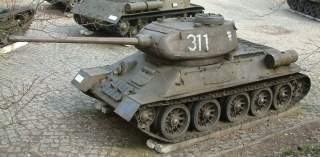Russia Might Have Lost World War II If Stalin Killed His Best General
He almost did.
Beginning in 1936, Soviet dictator Joseph Stalin set about deliberately murdering 700,000 people in the Great Purge, an act of mass killing that “constituted a form of rule” unto itself, as Stalin biographer Stephen Kotkin explained.
The armed forces were not spared. The purges swept through the officer corps, including 154 division commanders — of 186 in total — and resulted in the NKVD executions of several of the country’s most innovative and senior military thinkers, including Mikhail Tukhachevsky who was forced into signing a confession under torture before his murder. Thousands of officers were executed.
Georgy Zhukov, then a cavalry commander, escaped the purges and went on to become one of the most senior Soviet military leaders, a war hero and one of the most well-known and respected generals in modern history — implementing the theory of “deep operations” on the Eastern Front which Tukhachevsky had pioneered on the drawing board.
Zhukov was also once marked for death.
“The necessary fatal documents were prepared on me; apparently they were already sufficient, someone somewhere was running with a briefcase in which they lay,” Zhukov said during a 1971 interview, according to Otto Preston Chaney’s 1971 biography of the marshal.
The question — which is difficult to answer — is how Zhukov avoided being swept up in the purges during the darkest days of the late 1930s. In his memoirs, Zhukov recalled several close calls and probing interviews with political commissars.
One such commissar, the later marshal Filipp Golikov, questioned Zhukov in 1937 following the arrest of Danil Serdich, the commander of the Third Cavalry Corps. Zhukov was set to replace Serdich, amounting to a promotion. When Golikov asked Zhukov about his impressions of Serdich, Zhukov replied that he considered the purged general to be a patriot and among “the most honest Communists.”
Chaney recalled:
Golikov stood up and, “turning red up to his ears,” said: “And is it not dangerous for a future corps commander to eulogize an enemy of the people?” Zhukov answered that he did not know why these people had been arrested and believed some sort of mistake had been made. From Golikov’s hostile tone, it appeared that he had made up his mind. Rummaging in his bulky file he read from a paper for about five minutes and then said: “Here in the dispatches of [N.A.] Yung, the Commissar of the Third Cavalry Corps, it was reported that you were sharply rude in the treatment of subordinate commanders and political workers and that you sometimes underrated the role and significance of political workers. Is that true?”
Casting aspersions on the performance of political officers was a serious allegation. Zhukov replied deftly, by attacking the communist political workers as not being sufficiently … communist. These officers “occupied themselves with demagogy when they should have demonstrated Bolshevik steadfastness and persistence,” Zhukov said.
It didn’t hurt Zhukov that Yung, the Third Cavalry Corps commissar, was purged several weeks later — essentially invalidating his own critical reports of Zhukov, who was privately pleased at Yung’s comeuppance.
But in the mad paranoia of the period, Yung’s reports delayed Zhukov’s promotion. This offers one explanation as to why Zhukov survived the purges. Had he been promoted sooner, his chances of being purged would have been greater — as the higher the rank, the more likely one would fall into Stalin’s and the NKVD’s sights.
It was typical of Stalin’s purges that the closer one was to the center of power, the greater the risk.
However, there were a few scary moments to come once Zhukov took over the Corps in July 1937. He vouched for and saved a divisional commander, V. Ye. Belokoskov, from certain death as the general was friends with several officers who had been purged. Beloksokov would become an important officer managing logistics during World War II.
Zhukov then took over command of the Sixth Cossack Corps after its general, Ye. I. Goryachev, committed suicide while under suspicion due to his ties with Serdich, among other purged officers.
Then while in command of the Sixth Cossack Corps, Zhukov’s immediate superior — the army commander I.P. Belov — was arrested and shot. In a twisted irony, Belov had previously denounced some of his former comrades, including the pioneering Tukachevsky.
At this point, Zhukov was likely next with Belov out of the picture. The future marshal heard rumors of such.
However, in 1938, with escalating border skirmishes with Japan over Mongolia, the Soviet high command ordered Zhukov to take command of the First Soviet Mongolian Army Group, which he would lead to victory over Japan at the Battle of Khalkhin Gol in an early example of massed Soviet armored warfare. Returning to Moscow, the Kremlin awarded the now-favored general the Hero of the Soviet Union, the country’s highest distinction.
The paranoia of the Stalinist era remained like a dark cloud over his head. Zhukov kept a prepared bag of personal items in case he was arrested up to 1957, according to Chaney, four years after Stalin’s death. He never needed it, although the Communist Party’s Central Committee pushed him into forced retirement the same year, as Nikita Khrushchev consolidated power.
In retirement, U.S. Pres. Dwight Eisenhower — a friend of Zhukov’s — sent the old marshal a set of fishing tackle.
This article by Robert Beckhusen originally appeared at War is Boring in 2018.
Image: Wikimedia

